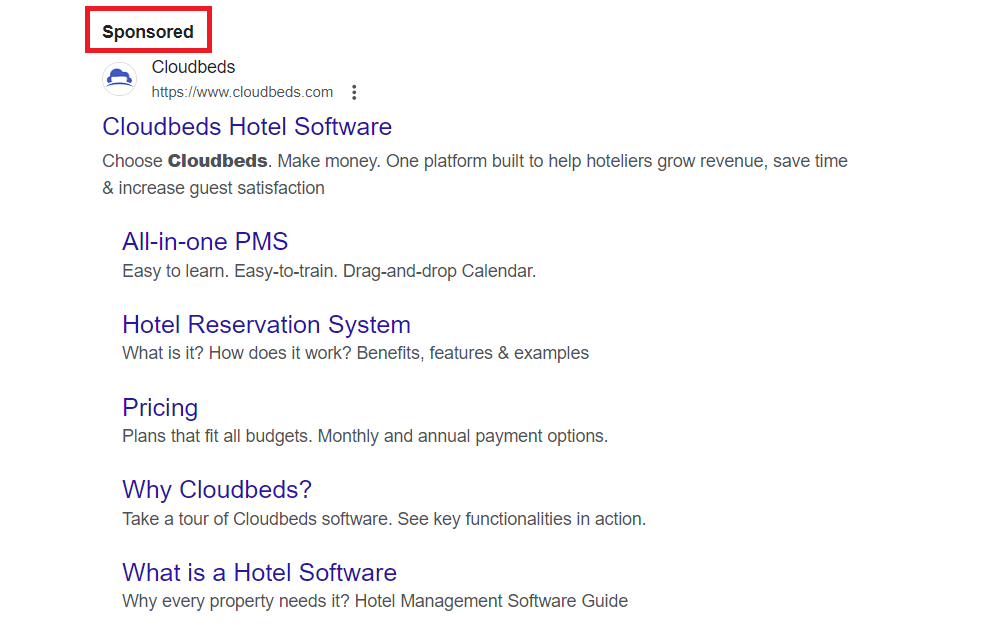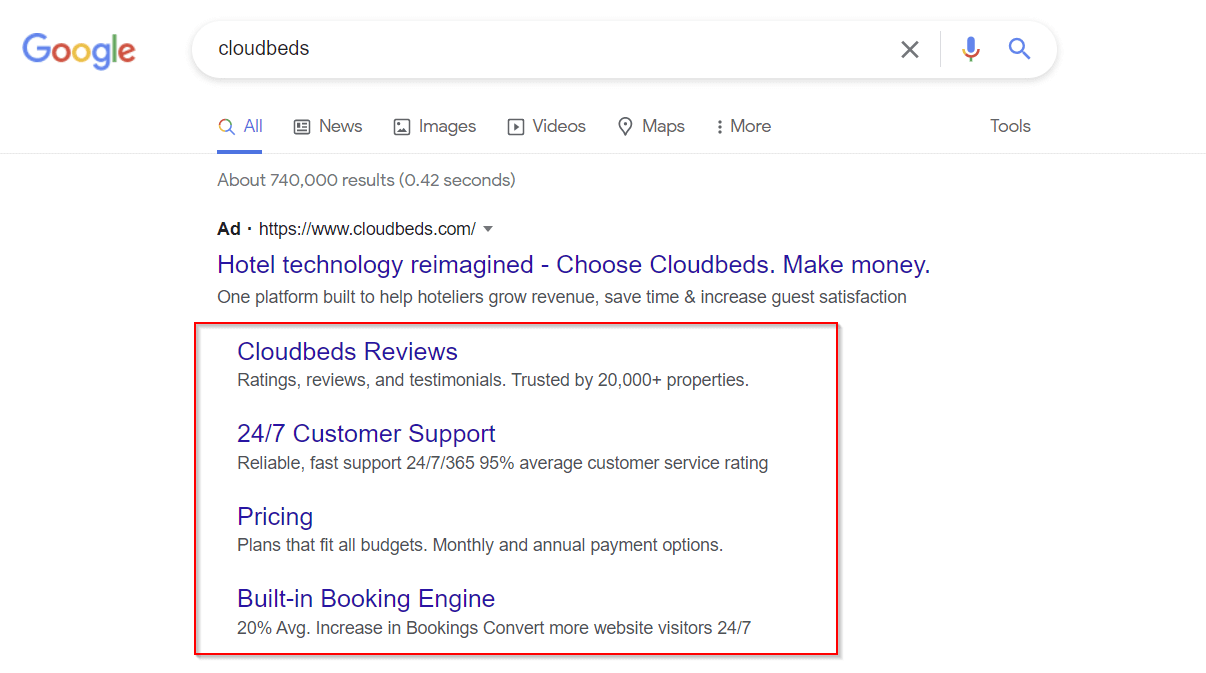The complete guide to
hotel search engine marketing
No matter what property type you run, driving direct bookings is key to maximizing revenue. To increase your visibility and attract travelers to your hotel website, appearing on the first page of search results such as Google, Bing, or Yahoo is critical.
While ranking on the first page may sound straightforward, it requires building out a comprehensive search engine marketing (SEM) strategy to compete with other properties, online travel agencies (OTAs), metasearch sites, and more. With the right investment in your search engine marketing efforts, your property can effectively compete against the thousands of listings online today.
The following is a complete guide to hotel search engine marketing and how to start building your strategy today.
What is hotel search engine marketing?
Hotel search engine marketing (SEM) is the practice of using paid ads to get your hotel to rank higher in search engine results. With Google averaging 85 billion visits per month, having your hotel rank in the top search results can drive major visibility and traffic to your website.
To identify a paid placement on the search engine results pages (SERP), look for the “Sponsored” icon on the top left corner beside the URL. This is what differentiates a paid advertisement (driven by SEM) from an organic search result (driven by search engine optimization (SEO).

Why use SEM?
Most potential guests today do all of their accommodation research and booking online. Therefore, being near the top of search results is key to ensuring that you make the list of accommodations for consideration.
Many properties rely on organic or non-paid digital marketing strategies to get them to the top of search engine results, which can take months or even years to achieve top rankings. SEM campaigns can help you see more instant results. This strategy can be beneficial for new properties that are just starting out or properties that need to reach specific goals and target audiences within a shorter period of time.
How does SEM work?
Keyword research is the pivotal starting point for any paid campaign. Keywords are common words or phrases that people enter into search engines to look for information.
To increase visits to specific pages on your website, you can use paid advertising, such as pay-per-click (PPC) ads, to target specific keywords that will drive traffic and other actions (such as conversions) on your website.
Shorter, more broad keywords such as “nice hotels” will have a high search volume and, therefore, high competition, making it difficult for your ad to rank in search engine results pages (SERPs). Targeting long-tail keywords such as “hotels with a pool in New York near Time Square” will have a lower search volume and competition level, making it easier to rank higher in results. These more targeted keywords also result in higher conversion rates as travelers with specific search queries are more likely ready to book than those with broad searches.
You can utilize online tools such as Semrush, Google Keyword Planner, and Ahrefs to narrow down keywords best suited for your property based on volume, keyword difficulty, and more. Remember to consider the search intent of potential customers when determining what keywords to target. Intent looks past the actual search term and into the motivation behind the search.
Bidding for keywords
Once you’ve identified which keywords to target, you must enter into a “bidding war” with other properties and OTAs who are competing for the same keyword.
Google dominates search engine use with an 82% market share, and it is recommended to start with Google when launching paid ads. The Google Ads algorithm uses multiple factors to determine how the ads should be ranked:
- Maximum cost per click (CPC) bid. What is the maximum amount that you are willing to pay per each link click
- Quality score. How relevant is your ad to the keyword that you are bidding on. To keep your quality score high, make sure that you are writing ad copy that is relevant to the target keyword and the associated landing page matches what the user is looking for.
These two scores are then multiplied together by Google to determine your final ad rank. The higher your ad rank, the higher your ad will show on Google search results. Every single one of your ads on Google will go through this ad auction process before appearing on result pages.
Hotel brand name searches
You may assume that your property will organically rank first on Google for its own brand name. However, this is not always the case. OTAs or savvy competitors with large digital marketing budgets will often bid on a property’s branded keywords, or phrases that include your property’s brand or brand name. They do this in order to rank above a property’s own website and drive traffic to their booking website first in order to receive commissions.
To prevent this from happening, and have travelers complete their hotel bookings directly through your website, you should include branded keywords as part of your SEM strategy. Make sure that, when bidding on keywords, you consider alternative phrases that travelers may search when looking for your property. Often, travelers use slight variations when searching online, and these phrases should be accounted for (i.e. using hotel instead of hostel).
5 tips for a successful SEM campaign
To ensure that your money is well spent and you are generating the desired results set out for your campaign, here are a few tips to incorporate into your strategy.
1. Make your ad copy eye-catching. Entice travelers to click the link to visit your site. This can be achieved through interesting and engaging copy and by taking advantage of site extensions that provide links to additional landing pages to visit.

2. Conduct thorough keyword research. Use the Google keyword planner to manage your keywords and ensure you’re targeting high-quality terms. Don’t be afraid of using low-volume keywords, as they are hyper-targeted and can lead to more conversions.
3. Ensure that the landing page you’re linking to is relevant. The keyword that you’re targeting through your ads should be incorporated into your landing page headline and on-page copy. Also, make sure that your landing page is optimized for mobile devices to ensure the best user experience possible.
4. Set a competitive budget and bid at ad auctions. The likelihood of your ad being seen relies on a sufficient budget combined with relevant content. Make sure you choose keywords that fit within your allocated budget.
5. Always optimize your ads. Use Google Analytics to measure your campaign’s performance across metrics and make changes accordingly. Implement A/B testing to see what works best and optimize for conversions once you’ve gathered enough data.
What is the difference between hotel SEO & SEM?
If you’re new to marketing, differentiating between terms can be difficult. Search engine optimization (SEO) and search engine marketing (SEM) are often confused with one another, but the difference between the two is that one is completely organic or non-paid (SEO) and the other is paid (SEM).
A good search marketing strategy should incorporate both SEO and SEM and have them work in tandem to deliver the best results.
Don’t forget to optimize for local SEO
Local SEO is the process of improving search visibility for your local business. This should be a part of every hotelier’s SEO strategy since travelers will often search for ‘hotels near me’ to look for last-minute accommodations.
Google uses online information about your property from Google Business Profile, social media platforms such as LinkedIn, and listed phone numbers and addresses, to help your property show up in results when people search for nearby properties.
By optimizing your local SEO, your SEM efforts are more likely to rank higher on a SERP.
How SEO & SEM work together
SEO is the foundation for good SEM. As mentioned above, Google takes into consideration your website’s quality score when ranking your ads. A part of this quality score is Google identifying your website and web pages as credible. This is done through consistent SEO and content marketing efforts, such as producing high-quality website content with relevant keywords, link building and backlinking, properly formatting URLs, and more.
When combined, good SEO and SEM practices can help you attract high-quality website traffic that will lead to more direct bookings.
The benefits of search engine marketing for independent properties
Competing against OTAs and large hotel chains across the hospitality industry can be difficult for independent properties, especially since they are backed by large marketing budgets. Therefore, it’s important for properties to be strategic about their SEM strategy and target more inexpensive, long-tail, and branded keywords they are more likely to rank for.
After optimizing and testing your tactics, you’ll be able to determine what works best for your property. You should see benefits such as:
- Increased overall traffic to your hotel website
- Better visibility and brand awareness of your property across search engine result pages
- More qualified traffic to drive direct bookings
How to get started with search engine marketing
With 90% of online experiences starting with a search engine, it is so important to invest in SEM as part of your hotel marketing strategy. Below are some steps on how to get started, and remember, start slow and optimize for best results.
- Conduct keyword research. Keywords are the foundation of SEM. Utilize online apps and services such as Semrush, Google Keyword Planner, or Ahrefs to select the best keywords to target.
- Select your keywords. Decide which keywords to target based on search volume, competition, cost, and relevance. Remember to use niche keywords when possible – relevance is more important than search volume.
- Set up your campaign. Use Google Ads to run your campaign. Determine how much you want to set aside for your total budget and break up that amount as part of your keyword bidding strategy.
- Track your results. Monitor your campaign to see your click-through rates compared to how many reservations have been made through your booking engine.
- Ongoing management. When it comes to your ads, don’t just set it and forget it. Optimize for keywords to ensure you’re maximizing the ROI from your ad spend.
- Expand your advertising strategy. Test out different channels like Bing and Yahoo to find out which search engines deliver the best results.
SEM is an important digital marketing practice to implement in order to compete within the hotel industry. Without a paid online presence, your hotel’s website will likely get lost among the thousands of properties and OTAs online today. While it may seem daunting at first, establishing a simple, yet effective SEM strategy will pay off through increased brand awareness, more direct bookings, and steady occupancy.


















